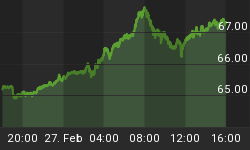As the biggest credit bubble in history continues to shrink, consumer prices have stayed flat over the past several months, meaning there is no sign of inflation to come, despite growing commitments from the U.S. government.
So what's keeping inflation at bay, given all the stimulus money promised? The answer: Deflation -- an overwhelming urge for consumers to liquidate their assets for cash. And this new economic phase is finally becoming too obvious to ignore, as explained in recent commentary from the world's largest technical analysis firm.
"The economy is moving into a critical new phase, an outright deflation in which 'prices fall because people expect falling prices.' Obviously, this implies an element of recognition, as efforts to protect against indebtedness and falling prices contribute to further declines. We can tell deflation is entering a new stage because of the language and ideas that financial observers now use to describe it." -- The Elliott Wave Financial Forecast (September 2010)
Here are a few recent comments about the new economic reality:
- "[New Jersey Governor] Christie spelled out the details of his proposal Tuesday. They include: repealing an increase in benefits approved years ago; eliminating automatic cost-of-living adjustments; raising the retirement age to 65 from 60 in many cases; reducing pension payouts for many future retirees; and requiring some employees to contribute more to their pensions." -- Associated Press (Sept. 15)
- "U.S. Home Prices Face Three-Year Drop as Inventory Surge Looms" -- Bloomberg (Sept. 15)
- "Atlanta Awash in Empty Offices Struggles to Recover From Building Binge" -- Bloomberg (Sept. 14)
- "The world economy faces a long, hard slog toward recovery and could slide into deflation and financial instability if leaders fail to deliver on promises of reform." -- Reuters (Sept. 10)
- "Deflation seems to have the upper hand lately in the debate among investors about inflation versus deflation." -- Marketwatch (Sept. 8)
- "With the release of the August sales figures, one thing is clear for car shoppers -- it's a buyer's market." -- Edmunds (Sept. 2)
- "20 Funds to Guard Against Deflation" -- Smartmoney (Aug. 29)
- "Dividend-Yield Signal Screams Deflation" -- Forbes (Aug. 25)
The word "deflation" also started appearing more in the financial media around 2002, but Robert Prechter, president of technical analysis firm Elliott Wave International and author of the 2002 New York Times best-seller Conquer the Crash, added in the updated 2009 edition of his book that the deflation references back then were in an entirely different context:
"The rarely used word deflation has become fashionable in financial discussion. ... It is fashionable, however, not to predict its occurrence but primarily to dismiss the idea that it has any serious likelihood of occurring. The president of the Federal Reserve Bank of Dallas said in May [2004] that there is 'maybe one chance out of four' that deflation will occur." -- Conquer the Crash, 2nd edition (2009)
And Prechter says the opinion from the Federal Reserve Bank of Dallas was not an isolated outlook at the time. Here's another quote from around the same time:
"Not one economist [of 67 surveyed] said it was 'very likely' the economy would slip into deflation, and only 6% said it was 'somewhat likely.' About 95% said deflation was 'not very likely' to happen." -- Barron's (2003)
In hindsight, we know that economists -- in the aggregate -- were dead wrong about their deflation predictions.
As we saw above, references to "deflation" are increasing now -- because it's obvious.
So if economists were unable -- or worse, unwilling -- to warn you in advance about the threat of deflation a few years ago, what are they not warning you about now?
Get an independent look at the future of the U.S. economy by reading Robert Prechter's FREE Deflation Survival Guide now. Newly updated for 2010, Prechter's 90-page ebook on deflation reveals the biggest threat to your money right now. You'll learn not only how to prepare for deflation and adapt during it; you'll also learn how to survive it and -- most important -- prosper during it, so you'll be ready for the buying opportunity of a lifetime at its end. Click Here to Download Your Free 90-Page Deflation eBook Now.
This article was syndicated by Elliott Wave International and was originally published under the headline The "Outright Deflation" Economy Enters A "Critical New Phase". EWI is the world's largest market forecasting firm. Its staff of full-time analysts led by Chartered Market Technician Robert Prechter provides 24-hour-a-day market analysis to institutional and private investors around the world.















